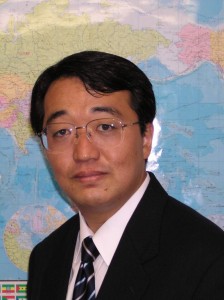緊張と統合:内村鑑三におけるキリスト教と日本の精神
このシリーズでは、私が1994年に執筆した統一神学大学院(Unification Theological Seminary)の神学課程修士論文(Divinity Thesis)を日英二か国語で掲載している。
結論の続き
このように内村のキリストに対する忠誠は、彼を社会制度の義務・役割から解放すると同時に、キリストにある新しいアイデンティティー(自己否定と献身)を彼に提供した。しかしキリストに対する忠誠は、これらの動機や行動をより高く超越的な次元へと引き上げ、彼はそこから自分の(キリストに対する)忠誠の性質を、彼の家庭的、社会的、国家的役割における行動という面と、社会におけるこれらの人間としての役割を果たしていく上での動機と願望という面の両方において、批判的に判断することが出来たのである。
しかし時が経つにつれて、彼は人間の文化に対してより悲観的になり、『二元論者』の立場に近づいて行った。彼のキリスト教文明に対する希望は、第一次世界大戦によって完全に破壊され、彼は最終的にキリストの再臨の信仰に至ったのである。このようにして内村の信仰は成熟した。彼は現在の世界においては全てが矛盾しており、この矛盾の真の解決は、将来現在の世界が作り変えられるときにのみあることを学んだのである。彼は自分の神に対する信頼にのみ慰めを見出し、待ち望むこと、そして忍耐強く苦しみを受けることさえも決意したのである。
内村は死ぬ五年前に、有名な「二つのJ」の声明を英語と日本語の両方で書き記しており、それは彼のキリストに対する忠誠と祖国に対する愛を簡潔に表現している。
私は二つのJを愛する。第三のものはない。一つはイエス(Jesus)、もう一つは日本(Japan)である。私は自分がイエスと日本のいずれをより愛するのか、自分でも知らない。イエスのゆえに、私はヤソとして同胞に憎まれ、日本のゆえに、国民的であり偏狭だとして外国宣教師に嫌われる。だが、私はすべての友を失なうとも、イエスと日本を失なうことはない。
イエスのゆえに、父なる神のほか、いかなる神も神もしくは父として仰ぐことはできない。
また日本のゆえに、外国人の名によって来るいかなる信仰も受け入れることはできない。
飢えよ来たれ、死よ来たれ。私はイエスと日本を失うことはない。
私は日本的キリスト者である。たとえ宣教師たちがかかる名称を好まないと知ってはいても。
イエスと日本。私の信仰は一つの中心をもつ円ではなく、むしろ二つの中心をもつ楕円である。
私の心情と知性はこの二つの愛称を中心に回転する。そうして一方が他方を強める。
イエスは、私の愛国心を強め、清める。日本は、私のイエスへの愛を明らかにし、客観化する。
もしこのふたつがなかったなら、私は夢想家となり、狂信者となり、無定形の一般人となったであろう。
イエスは私を世界人とし、人類の友とした。日本は私を愛国者とし、それによって、私を地球とかたく結び付ける。
私はこのふたつを同時に愛することによって、狭くなりすぎも広くなりすぎもしない。
ああイエスよ。汝はわが魂の太陽であり、愛する救い主である。私は汝にすべてをささげる。
ああ日本よ。国々のなかの国よ。汝のために、われらはわれらの心と祈りと犠牲をささげよう。
汝のゆえに、われらは、けだかく生き、汝のために死ぬであろう。
Conclusion(Cont.)
Thus Uchimura’s loyalty to Christ both freed him from the ascribed role-obligations of his social order and provided him a new identity in Christ, a self-denial and self-dedication but set these motivations and actions in a higher or transcendent context from which he could critically judge the nature of his loyalty (to Christ) both in his actions in his roles in the family, society and nation and his motivations and aspirations in fulfilling these human roles in society.(3)
As time passed, however, he became more pessimistic about human culture and came closer to the position of dualists. His hope for Christian civilization was completely ruined by World War I, and finally he reached the faith in the Second Coming of Christ. Thus Uchimura had matured in faith; he had learned that everything is a paradox in the present world and the only real solution to this paradox lies in the future when the present world is replaced. He decided to wait and even to suffer patiently, finding his only consolation in his trust in God.(4)
Five years before his death, Uchimura composed in parallel English and Japanese his famous “Two J’s” statement, which expressed concisely his loyalty to Christ and love of country.
I love two J’s and no third; one is Jesus, and the other is Japan.
I do not know which I love more, Jesus or Japan.
I am hated by my countrymen for Jesus’ sake as yaso,(5)and I am disliked by foreign missionaries for Japan’s sake as national and narrow.
No matter; I may lose all my friends but I cannot lose Jesus and Japan.
For Jesus’ sake, I cannot own any other God than His Father as my God and Father; and for Japan’s sake, I cannot accept any faith which comes in the name of foreigners. Come salvation; come death; I cannot disown Jesus and Japan; I am emphatically a Japanese Christian, though I know missionaries in general do not like that name.
Jesus and Japan; my faith is not a circle with one center: it is an ellipse with two centers. My heart and mind revolve around the two dear names. And I know that one strengthens the other; Jesus strengthens and purifies my love for Japan; and Japan clarifies and objectifies my love for Jesus. Were it not for the two, I would become a mere dreamer, a fanatic, and amorphous universal man.
Jesus makes me a world-man, a friend of humanity; Japan makes me a lover of my country, and through it binds me firmly to the terrestrial globe. I am neither too narrow nor too broad by loving the two at the same time.
O Jesus, thou art the Sun of my soul, the saviour dear; I have given my all to thee!
O Japan,
Land of lands, for thee we give,
Our hearts, our pray’rs, our service free;
For thee thy sons shall nobly live,
And at thy need shall die for thee.”(6)
– J. G. WHITTER
(3)Ibid., p.97.
(4)Ibid., p.105.
(5)A derogatory term for a Christian.
(6)op cit, Uchimura, Zenshu, XV, 599-600.
